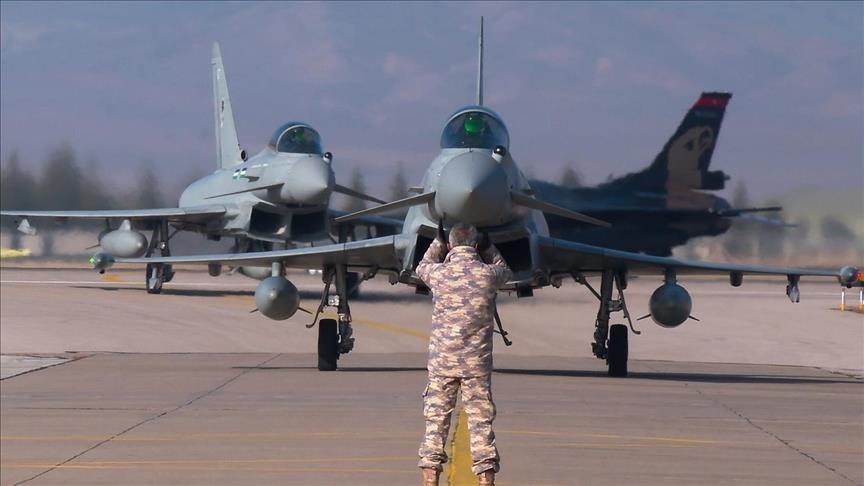OPINION - Eurofighter Typhoon agreement: Türkiye, Europe, and the future of defense cooperation
Turkish army, the 2nd-largest force in NATO, appears a natural substitute for decreased US presence in Europe. Türkiye’s role in patrolling the Black Sea, protecting NATO’s southern flank, and reaching out to the Global South make it a valuable ally

The author is a research analyst at the European Union Institute for Security Studies (EUISS).
ISTANBUL
On July 23, Türkiye and the United Kingdom signed a memorandum of understanding allowing Ankara to operate Eurofighter Typhoon fighter planes. The agreement came after Germany’s Security Council approved the sale of 40 Eurofighter jets. Turkish pilots will now be able to fly Typhoons, built by a consortium of stakeholders from the UK, Germany, Italy, and Spain.
This breakthrough – the result of changes in the strategic scenario, the German government, and US posture, even though they are not part of the project – could represent a step-change in operational cooperation between Türkiye and Europe. However, long-term challenges will not simply fade away.
3 reasons for the change
We can point out three main changes that facilitated the Eurofighter deal. The first is the shift in the strategic context. Back in 2019, Russia and Türkiye were normalizing relations after their 2015 aircraft shootdown incident. But since 2022, the two countries have drifted further apart. The Russian invasion of Ukraine created distance between Moscow and Ankara, with the latter supporting Ukraine with drones. Relations between Türkiye and other NATO countries have improved since Ankara dropped its opposition to Sweden’s accession to the alliance. Finally, the very volatile situation in the Middle East increased incentives for Ankara and other European capitals to cooperate to secure NATO’s southern flank. These changes in context created the permissive conditions for the deal.
A second contextual factor was continued uncertainty about the US posture. Despite a successful NATO summit a month ago, allies remain deeply uncertain about the US commitments to European defense. Türkiye still hopes that US President Donald Trump will behave differently in his second term and lift the F-35 ban. However, the administration’s stated goal to disengage from Europe creates incentives for Ankara to reduce its dependencies and strengthen ties with Europe.
The final key ingredient was the change in the German government. The new chancellor, Friedrich Merz, has reversed the previous government’s opposition to the sale of Typhoons to Ankara. Chancellor Olaf Scholtz had blocked the sale due to political considerations as well as fears that Türkiye could use the Typhoons against Greece. The new government agreed to lift its veto due to improvements in Turkish-Greek relations, Ankara’s agreement to use the fighters in NATO frameworks only, and the need to strengthen Europe’s defense partnerships.
More to come, or hold your fire?
Could the Eurofighter sale be a first step towards intensified defense cooperation between Türkiye and its European counterparts?
At first glance, it would make sense to strengthen ties. The upcoming US force posture review might recommend a significant reduction in the American presence in Europe – such as the 20,000 troops stationed in Poland since 2022. Europeans will need to make up for the reduction in the American conventional presence in Europe. The Turkish army, the second-largest force in NATO, appears a natural substitute. And Türkiye’s role in patrolling the Black Sea, protecting NATO’s southern flank and reaching out to the Global South make it a valuable ally.
Türkiye would also benefit from closer ties to the European defense and technological industrial base (EDTIB). NATO’s countries will increasingly invest in their defense base. Many of those investments will be in dual-use goods which could have implications for broader economic growth. The EU’s Rearm Europe plan promises to bring additional investments to strengthen the continent’s defense industry – including by integrating Ukraine’s now-advanced defense sector. For the Turkish defense industry, which increasingly exports to the European market (in 2024, total defense exports reached $7.15 billion, up 29% from 2023), it would be crucial to secure as large a share of this market as possible.
However, serious obstacles to cooperation will also remain. Some of the structural issues, such as the Cyprus question or recurring tensions with Greece, likely to continue limiting structural cooperation with the EU.
Nevertheless, these underlying tensions have not prevented the EU and Türkiye from meeting earlier this year under the framework of the Common Security and Defense Policy (CSDP). Hence, the near future could see increased cooperation between Türkiye and European counterparts. As the Eurofighter deal suggests, this will likely be matched by increased operational cooperation, both in NATO and in ad hoc coalitions (such as partnering with the reassurance force in Ukraine in the event of a ceasefire).
What does it mean for the future of the relationship? The worsening security environment is urging European and Turkish leaders to take a more pragmatic approach, in the name of strengthening European security. The Eurofighter deal could be part of this trend, and more deals could follow. Whether this will result in more structured cooperation remains uncertain. A more dynamic relationship may be on the horizon.
*Opinions expressed in this article are the author's own and do not necessarily reflect Anadolu's editorial policy.
Anadolu Agency website contains only a portion of the news stories offered to subscribers in the AA News Broadcasting System (HAS), and in summarized form. Please contact us for subscription options.







